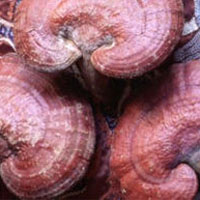Reishi
 © Steven Foster
© Steven FosterParts Used & Where Grown
Reishi mushrooms grow wild on decaying logs and tree stumps in the coastal provinces of China. The fruiting body of the mushroom is employed medicinally. Reishi grows in six different colours, but the red variety is most commonly used and commercially cultivated in North America, China, Taiwan, Japan, and Korea.1
- Reliable and relatively consistent scientific data showing a substantial health benefit.
- Contradictory, insufficient, or preliminary studies suggesting a health benefit or minimal health benefit.
- For an herb, supported by traditional use but minimal or no scientific evidence. For a supplement, little scientific support.
Our proprietary “Star-Rating” system was developed to help you easily understand the amount of scientific support behind each supplement in relation to a specific health condition. While there is no way to predict whether a vitamin, mineral, or herb will successfully treat or prevent associated health conditions, our unique ratings tell you how well these supplements are understood by the medical community, and whether studies have found them to be effective for other people.
For over a decade, our team has combed through thousands of research articles published in reputable journals. To help you make educated decisions, and to better understand controversial or confusing supplements, our medical experts have digested the science into these three easy-to-follow ratings. We hope this provides you with a helpful resource to make informed decisions towards your health and well-being.
This supplement has been used in connection with the following health conditions:
| Used for | Amount | Why |
|---|---|---|
Benign Prostatic Hyperplasia | 6 mg per day for 8 weeks | A double-blind trial found that an extract of Ganoderma lucidum mushroom was significantly more effective than a placebo in improving urinary symptoms in men with BPH.
|
Altitude Sickness | Refer to label instructions | Reishi has been reported to be a helpful treatment for altitude sickness but this use still needs to be confirmed in well-designed human trials. |
Hepatitis | Take zinc L-carnosine supplying 17 mg zinc twice daily | The mushroom reishi appears to be effective in treating chronic hepatitis B, according to preliminary research. |
HIV and AIDS Support | Refer to label instructions | Reishi is medicinal mushroom with immune-modulating effects that may be beneficial for people with HIV infection. |
Hypertension | 165 mg per day of a 25:1 concentrated extract | Reishi mushroom has anti-inflammatory and antioxidant effects, but clinical trials have not consistently shown it can lower blood pressure. |
Infection | Refer to label instructions | Reishi supports the immune system in the fight against microbes. |
Type 1 Diabetes | Refer to label instructions | Reishi may improve immune function and has demonstrated benefits in diabetic animals. |
Type 2 Diabetes | Refer to label instructions | Reishi may have some beneficial action in people with diabetes. |
Traditional Use (May Not Be Supported by Scientific Studies)
Reishi has been used in Traditional Chinese Medicine for at least 2,000 years.2 The Chinese name ling zhi translates as the “herb of spiritual potency” and was highly prized as an elixir of immortality.3 Its Traditional Chinese Medicine indications include treatment of general fatigue and weakness, asthma, insomnia, and cough.4
Copyright © 2024 TraceGains, Inc. All rights reserved.
Learn more about TraceGains, the company.
The information presented by TraceGains is for informational purposes only. It is based on scientific studies (human, animal, or in vitro), clinical experience, or traditional usage as cited in each article. The results reported may not necessarily occur in all individuals. Self-treatment is not recommended for life-threatening conditions that require medical treatment under a doctor's care. For many of the conditions discussed, treatment with prescription or over the counter medication is also available. Consult your doctor, practitioner, and/or pharmacist for any health problem and before using any supplements or before making any changes in prescribed medications. Information expires December 2024.



 We are proud to announce that
We are proud to announce that  As the market evolves, customers increasingly request a wider variety of omega-3 options for their lipid...
As the market evolves, customers increasingly request a wider variety of omega-3 options for their lipid...  Maintaining healthy glucose levels is crucial for preventing metabolic conditions like diabetes,...
Maintaining healthy glucose levels is crucial for preventing metabolic conditions like diabetes,...  Looking at formulating a new vitamin blend? Discover
Looking at formulating a new vitamin blend? Discover 







































